Canadian Human Rights Commission Discloses COVID-19 Complaint Records
The Canadian Human Rights Commission (CHRC) has released an initial batch of documents that provide insight into how the agency processed complaints related to COVID-19.
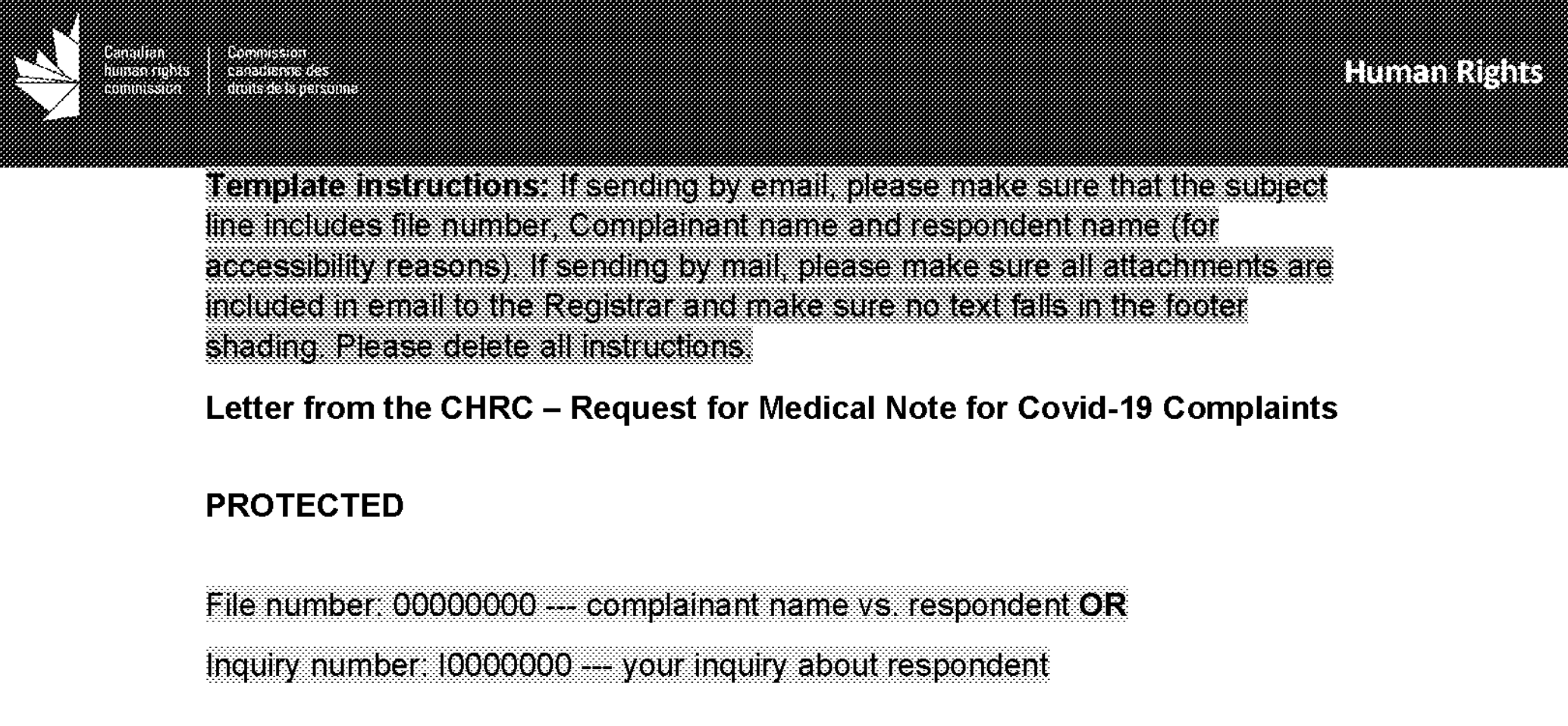
The Canadian Human Rights Commission (CHRC) has released an initial batch of documents that provide insight into how the agency processed complaints related to COVID-19.
On January 24, 2024, we submitted a request to the CHRC under the Access to Information Act, seeking the following:
“Please provide all instructions, procedures, guidelines or memoranda of best practices related to the processing and/or consideration of mask-related complaints issued to or within the CHRC in 2020, 2021 and 2022.”
The CHRC disclosed some documents on February 20, 2024, and did not indicate that there were further records the agency withheld. The disclosure package is available in full at the end of this post, and on the Internet Archive.
However, Director General Natalie Dagenais noted in her letter that certain portions of the disclosed documents were redacted under section 23 of the Access to Information Act. Section 23 allows the “head of a government institution” to “refuse to disclose any record… that contains information that is subject to solicitor-client privilege or the professional secrecy of advocates and notaries or to litigation privilege.”
Based on the unredacted portions, here are our main takeaways.
CHRC Is Pro-Mandates
Despite its ostensible role as an impartial arbiter in human rights disputes, the CHRC made clear that it did not object to mask and vaccine mandates in the context of the COVID-19 pandemic.
In what appears to be a draft Frequently Asked Questions page, the CHRC asserts that vaccination requirements do not “violate human rights principles” because “rights are not absolute.” The CHRC explains that “reasonable limits can be placed on our rights when it applies to public health and safety,” and “requiring that an individual be vaccinated to work or travel is not a discriminatory practice under the Canadian Human Rights Act” (CHRA). This is the case, according to the CHRC, “because they are intended (and are necessary) to protect public health and safety.” The CHRC asserts the same about masks.
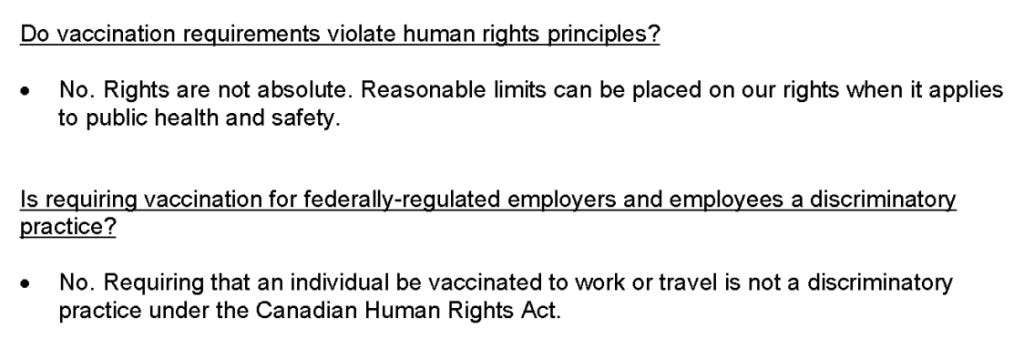
Of course, this doesn’t eliminate the requirement for employers and service providers to accommodate those unable to wear a mask/take a test/be vaccinated because of a protected characteristic, as required under the CHRA.
Fake Exemption Cards?
In the same draft FAQ, the CHRC warns about “fake exemption cards” claiming to exempt a user from mask requirements, some of which are fraudulently labelled as being issued by the CHRC. The CHRC asserts that “these cards are fake”—but the way the FAQ is worded results in ambiguity as to whether all mask exemption “cards” are fake, or just those claiming to be issued by the CHRC.
Mask Complaint Processing
The next set of documents in the disclosure package is a chain of heavily redacted emails. While nearly everything in the email bodies themselves is obscured, the subject line reads “Processing Mask Complaints”.
The emails were exchanged between December 18-21, 2021. Most notably, an email from CHRC lawyer Ceilidh Snider mentions a “CSC” meeting that took place on December 16, 2021. While the acronym “CSC” is not explained in the email itself, it may refer to the Correctional Service of Canada, an agency of the federal government responsible for federal prisons.
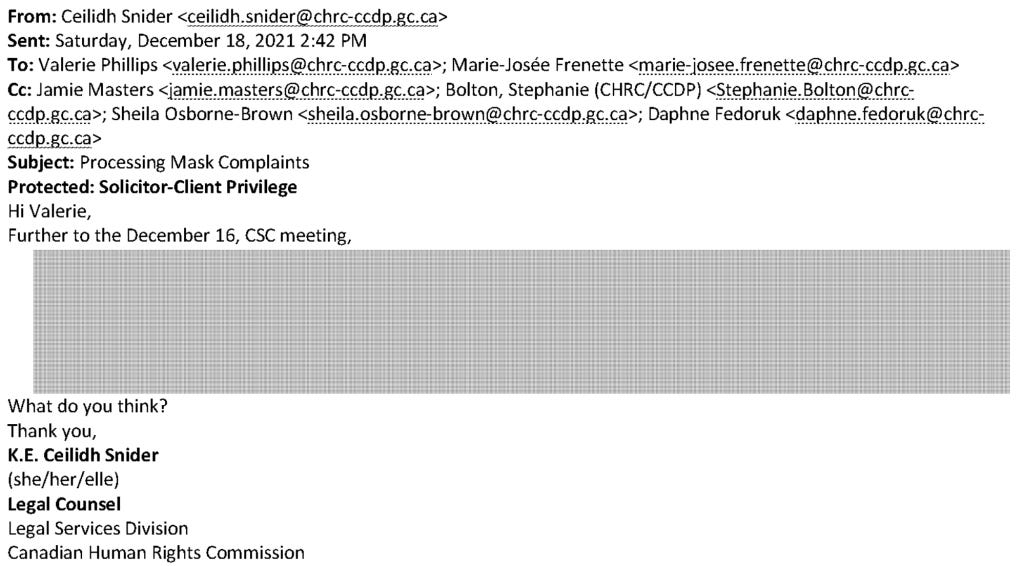
The participants in the email chain are as follows:
-
Ceilidh Snider – Legal Counsel[1]
-
Valerie Phillips – General Counsel and Director General of Complaints Services Branch[2]
-
Marie-Josée Frenette – Director, Mediation Services and Initial Review Division[3]
-
Stephanie Bolton – Manager, Initial Review[4]
-
Jamie Masters – Senior Advisor, Complaints Coordination and Equal Access Division[5]
-
Sheila Osborne-Brown – Senior Legal Counsel[6]
-
Daphne Fedoruk – Senior Legal Counsel[7]
Medical Note Request Template
Also included in the document release was a “Draft Template Email Requesting Medical Note for Covid-19 Complaints” in both English and French. Dated January 28, 2022, the template requests “a note from your medical practitioner confirming that you have a disability that does not permit you to [wear a mask] for COVID-19,” stating that “the Commission cannot accept your complaint without the requested medical note.”
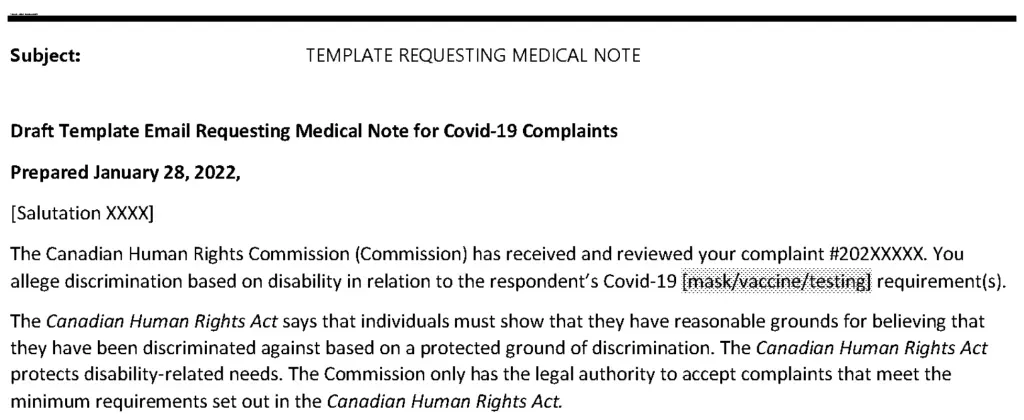
It also notes that a service provider (the “respondent”) “may not request this medical note in the provision of the service you requested”.
Notably, the template ends by mentioning that a “mutually acceptable arrangement” could be made in place of such a note.
A second draft of the template notes that “individuals must show that they have reasonable grounds for believing that they have been discriminated against based on a protected ground of discrimination.” It also adds vaccine and testing requirements to the list of possible complaints for which the template could be used.
Fully-Redacted Draft
Finally, the package contains a pair of pages that appear to contain a completely-redacted draft document of some kind. It is entirely unclear what the nature of this document was.
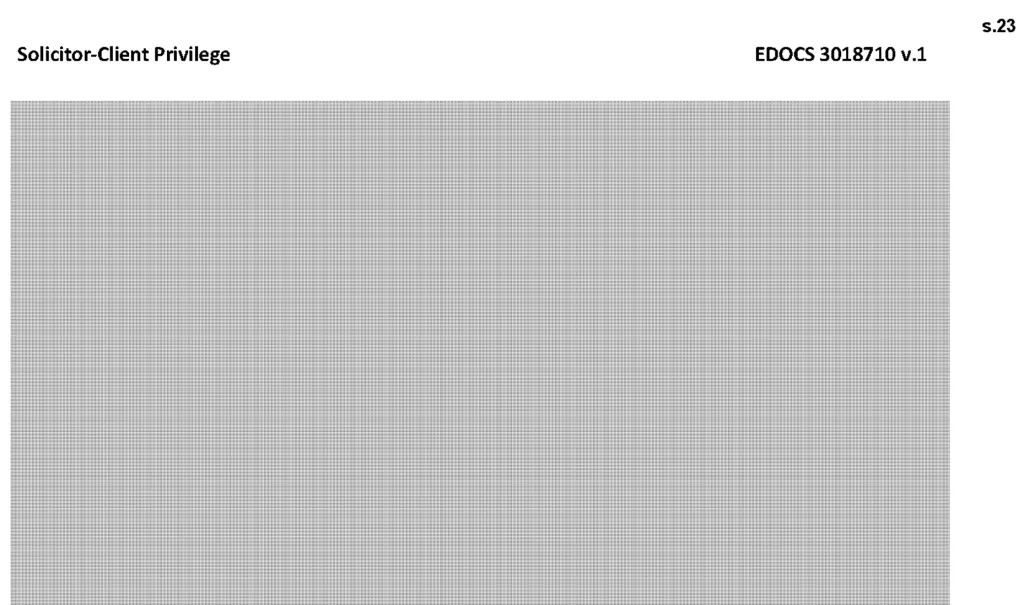
Next Steps
We will be filing a follow-up request for the following clarifications/additional disclosures:
- Records related to the December 16, 2021 “CSC meeting”;
- Records related to medical/doctor’s notes in processing COVID-19 related complaints;
- The final draft of the currently-redacted document on page 9 of the package;
- The contents of page 10, which currently says “Page 10 is not reviewed.”
Read or download the full release package below. Don’t forget to sign up for our newsletter to stay up-to-date on the progress of this and other freedom of information requests we make at White Rose Intelligence.
Canadian Human Rights Commission. (2024). ATIP Request A-2023-00030 / AT (p. 6). Internet Archive. https://archive.org/details/canadian-human-rights-commission-atip-request-a-2023-00030-at/mode/2up ↩︎
Malischewski, C.-A. (2023, April 18). Appearance before the Senate Committee of Indigenous Peoples (APPA) on the topic of a Canadian Human Rights Framework. Canadian Human Rights Commission. https://web.archive.org/web/20240214015805/https://www.chrc-ccdp.gc.ca/en/resources/appearance-the-senate-committee-indigenous-peoples-appa-the-topic-a-canadian-human-rights ↩︎
Marie-Josée Frenette. GOC411. Retrieved March 3, 2024, from http://archive.today/2024.03.03-225142/https://www.goc411.ca/en/256426/Marie-Josee-Frenette ↩︎
Stephanie Bolton. GOC411. Retrieved March 3, 2024, from https://web.archive.org/web/20240303225439/https://www.goc411.ca/en/408167/Stephanie-Bolton ↩︎
Jamie Masters. GOC411. Retrieved March 3, 2024, from http://archive.today/2024.03.03-230956/https://www.goc411.ca/en/37431/Jamie-Masters ↩︎
Sheila Osborne-Brown. GOC411. Retrieved March 3, 2024, from http://archive.today/2024.03.03-231757/https://www.goc411.ca/en/37465/Sheila-Osborne-Brown ↩︎
Daphne Fedoruk. Preparing for Further Changes to the Canada Labour Code (March 16-17, 2021 · Workshop: March 15, 2021 · Virtual Conference); Infonex. Retrieved March 3, 2024, from http://archive.today/2024.03.03-232124/https://infonex.com/1390/speakers_card/francois-beauregard/ ↩︎